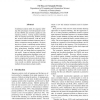Free Online Productivity Tools
i2Speak
i2Symbol
i2OCR
iTex2Img
iWeb2Print
iWeb2Shot
i2Type
iPdf2Split
iPdf2Merge
i2Bopomofo
i2Arabic
i2Style
i2Image
i2PDF
iLatex2Rtf
Sci2ools
NAACL
2003
2003
Shallow Parsing with Conditional Random Fields
Conditional random fields for sequence labeling offer advantages over both generative models like HMMs and classifiers applied at each sequence position. Among sequence labeling tasks in language processing, shallow parsing has received much attention, with the development of standard evaluation datasets and extensive comparison among methods. We show here how to train a conditional random field to achieve performance as good as any reported base noun-phrase chunking method on the CoNLL task, and better than any reported single model. Improved training methods based on modern optimization algorithms were critical in achieving these results. We present extensive comparisons between models and training methods that confirm and strengthen previous results on shallow parsing and training methods for maximum-entropy models.
Related Content
| Added | 31 Oct 2010 |
| Updated | 31 Oct 2010 |
| Type | Conference |
| Year | 2003 |
| Where | NAACL |
| Authors | Fei Sha, Fernando C. N. Pereira |
Comments (0)

